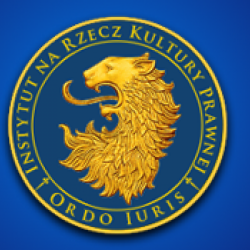Informujemy, że Pani/Pana dane osobowe są przetwarzane przez Fundację Instytut na Rzecz Kultury Prawnej Ordo Iuris z siedzibą w Warszawie przy ul. Zielnej 39, kod pocztowy 00-108 (administrator danych) w ramach utrzymywania stałego kontaktu z naszą Fundacją w związku z jej celami statutowymi, w szczególności poprzez informowanie o organizowanych akcjach społecznych. Podstawę prawną przetwarzania danych osobowych stanowi art. 6 ust. 1 lit. f rozporządzenia Parlamentu Europejskiego i Rady (UE) 2016/679 z 27 kwietnia 2016 r. w sprawie ochrony osób fizycznych w związku z przetwarzaniem danych osobowych i w sprawie swobodnego przepływu takich danych oraz uchylenia dyrektywy 95/46/WE (RODO).
Podanie danych jest dobrowolne, niemniej bez ich wskazania nie jest możliwa realizacja usługi newslettera. Informujemy, że przysługuje Pani/Panu prawo dostępu do treści swoich danych osobowych, ich sprostowania, usunięcia lub ograniczenia przetwarzania, prawo do przenoszenia danych, prawo wniesienia sprzeciwu wobec ich przetwarzania, a także prawo do wniesienia skargi do organu nadzorczego.
Korzystanie z newslettera jest bezterminowe. W każdej chwili przysługuje Pani/Panu prawo do wniesienia sprzeciwu wobec przetwarzania danych osobowych. W takim przypadku dane wprowadzone przez Pana/Panią w procesie rejestracji zostaną usunięte niezwłocznie po upływie okresu przedawnienia ewentualnych roszczeń i uprawnień przewidzianego w Kodeksie cywilnym.
Do Pani/Pana danych osobowych mogą mieć również dostęp podmioty świadczące na naszą rzecz usługi w szczególności hostingowe, informatyczne, drukarskie, wysyłkowe, płatnicze. prawnicze, księgowe, kadrowe.
Podane dane osobowe mogą być przetwarzane w sposób zautomatyzowany, w tym również w formie profilowania. Jednak decyzje dotyczące indywidualnej osoby, związane z tym przetwarzaniem nie będą zautomatyzowane.
W razie jakichkolwiek żądań, pytań lub wątpliwości co do przetwarzania Pani/Pana danych osobowych prosimy o kontakt z wyznaczonym przez nas Inspektorem Ochrony Danych pisząc na adres siedziby Fundacji: ul. Zielna 39, 00-108 Warszawa, z dopiskiem „Inspektor Ochrony Danych” lub na adres poczty elektronicznej [email protected]
Data publikacji: 20.09.2016

Zgromadzenie Parlamentarne Rady Europy (PACE) przyjęło 24 kwietnia 2013 r. tekst rezolucji dotyczącej ochrony praw człowieka w odniesieniu do wolności wyznania i wiary oraz zabezpieczania wspólnot religijnych przed aktami przemocy (Resolution 1928 (2013), Poseł sprawozdawca Luca Volonte, Włochy). Jak wskazuje punkt 8 rezolucji, wspólnoty religijne są chronione w dużo większym stopniu w Europie niż w Afryce, Azji czy na Bliskim Wschodzie. Parlamentarzyści dostrzegają jednak europejskie problemy związane z przestrzeganiem postanowień art. 9 Europejskiej Konwencji Praw Człowieka (wolność myśli, sumienia i wyznania) i wzywają europejskich przywódców religijnych do uznania zasady poszanowania praw każdego człowieka bez względu na wyznawaną religię. PACE zachęca również Unię Europejską do monitorowania sytuacji wspólnot religijnych i osób wierzących w państwach trzecich, z którymi UE utrzymuje stosunki dyplomatyczne.
Zgromadzenie Parlamentarne Rady Europy wyraziło swoje zaniepokojenie odnotowanym wzrostem aktów przemocy (zarówno fizycznej jak i psychicznej) wobec wspólnot religijnych oraz wyznawców różnych religii na całym świecie. W rezolucji 1928 (2013) parlamentarzyści przypominają zobowiązanie państw do przestrzegania postanowień: Europejskiej Konwencji Praw Człowieka (art.9), Powszechnej Deklaracji Praw Człowieka (art. 18), Międzynarodowego Paktu Praw Politycznych i Obywatelskich, Deklaracji ONZ w sprawie eliminacji wszelkich form nietolerancji i dyskryminacji opartych na religii lub przekonaniach (art. 18). Przywołany jest również szereg przyjętych przez PACE rezolucji, istotnych w aspekcie wolności religii (w szczególności Rezolucja 1510 (2006) dot. wolności wyrażania opinii w zakresie przekonań religijnych). Podkreślona została również potrzeba walki z wszelkimi formami religijnego fundamentalizmu, szczególnie w tych przypadkach kiedy przekonania religijne są pobudką dla dokonywania aktów terrorystycznych.
W punkcie 9 przedmiotowej rezolucji Zgromadzenie Parlamentarne Rady Europy wzywa państwa członkowskie m.in do:
- zapewniania równych zasad traktowania osób w postępowaniach toczących się przed podmiotami państwowymi, bez względu na wyznawaną religię;
- uwzględniania sytuacji wspólnot religijnych w bilateralnym dialogu politycznym;
- ochrony praw kobiet i zapewniania, że religia nie jest usprawidliwieniem dla przemocy wobec kobiet;
-gwarantowania wolności myśli w zakresie usług systemu zdrowia, edukacji i opieki społecznej;
- zapewniania prawa do postępowania zgodnie z sumieniem, w odniesieniu do moralnie ważkich zagadnień w dziedzinach takich jak służba wojskowa oraz usługi związane z systemem zdrowia i edukacją;
- respektowania praw rodziców dostępu dla ich dzieci do edukacji, w tym do edukacji zgodnej z religijnymi i filozoficznymi przekonaniami rodziców;
- zmiany prawa krajowego w zakresie, w jakim jest ono sprzeczne z wolnością zgromadzenia bez względu na wyznawaną religię czy przekonania;
- uznawania potrzeby zapewnienia ochrony osobom szukającym azylu ze względu na prześladowania religijne;
- przyspieszenia i szybkiego zakończenia w państwach członkowskich Rady Europy procesu zwracania mienia kościelnego.
Dyrektor European Center for Law and Justice, dr Grégor Puppinck podkreśla, że: "Na tę rezolucję mogą się powoływać obrońcy praw rodziców czy obrońcy praw człowieka w odniesieniu do edukacji i obowiązywania klauzuli sumienia. Może być ona również pomocna instytucjom religijnym (np. szkołom prywatnym, pracodawcom będącym podmiotami kościelnymi) w utrzymywaniu ich instytucjonalnej i moralnej autonomii w opozycji do tzw. nowej oficjalnej moralności (aborcja, eutanazja, LGBT, edukacja oparta o teorię gender)."
Opracowanie: Centrum Prawne Ordo Iuris
Resolution 1928 (2013) Provisional version
Safeguarding human rights in relation to religion and belief and protecting religious communities from violence
Author(s): Parliamentary Assembly
Origin: Assembly debate on 24 April 2013 (14th Sitting) (see Doc. 13157, report of the Committee on Political Affairs and Democracy, rapporteur: Mr Volontè; and Doc. 13178, opinion of the Committee on Migration, Refugees and Displaced Persons, rapporteur: Mr Türkeş). Text adopted by the Assembly on 24 April 2013 (14th Sitting).
1. The Parliamentary Assembly is concerned about the increasing occurrence of violent attacks against religious communities and individuals throughout the world on the basis of their religion or beliefs. It notes that there is not only physical, but also psychological violence against persons because of their religion or beliefs and it condemns such violence in unequivocal terms.
2. The Assembly recalls that freedom of thought, conscience and religion are universal human rights enshrined in Article 9 of the European Convention on Human Rights (ETS No. 5) and Article 18 of the Universal Declaration of Human Rights, which every member State of the United Nations has committed to uphold: “Everyone has the right to freedom of thought, conscience and religion; this right includes freedom to change his religion or belief, and freedom, either alone or in community with others and in public or private, to manifest his religion or belief, in teaching, practice, worship and observance.”
3. The Assembly also wishes to draw attention to Article 18 of the 1966 International Covenant on Civil and Political Rights and to the 1981 United Nations Declaration on the Elimination of All Forms of Intolerance and of Discrimination Based on Religion and Belief; moreover, it reaffirms the utmost importance of the autonomy of religious communities and of their separation from the State, as well as of the neutrality and impartiality of the State on religious matters.
4. The Assembly has consistently drawn attention to the importance of upholding freedom of conscience and of religion, which can only be subject to the limitations that are necessary in a democratic society. The following texts are relevant in this context: Recommendation 1162 (1991) on the contribution of the Islamic civilisation to European culture; Recommendation 1396 (1999) on religion and democracy; Recommendation 1720 (2005) on education and religion; Resolution 1464 (2005) on women and religion in Europe; Resolution 1510 (2006) on freedom of expression and respect for religious beliefs; Recommendation 1804 (2007) on State, religion, secularity and human rights; Resolution 1535 (2007)on threats to the lives and freedom of expression of journalists; Resolution 1580 (2007) on the dangers of creationism in education; Resolution 1605 (2008) and Recommendation 1831 (2008) on European Muslim communities confronted with extremism; Recommendation 1805 (2007) on blasphemy, religious insults and hate speech against persons on grounds of their religion; Resolution 1743 (2010) and Recommendation 1927 (2010) on Islam, Islamism and Islamophobia in Europe; and Recommendation 1957 (2011) on violence against Christians in the Middle East.
5. It recalls, in particular, Resolution 1510 (2006) on freedom of expression and respect for religious beliefs, in which it stated that “freedom of expression as protected under Article 10 of the European Convention on Human Rights should not be further restricted to meet increasing sensitivities of certain religious groups”. It emphasises that, as a general rule, freedom of expression should not be restricted to meet the sensitivities of any group in a democratic society.
6. The Assembly condemns any instances of negative stereotyping of persons based on religion as well as the advocacy of religious hatred that constitutes incitement to discrimination, hostility or violence.
7. The Assembly also wishes to insist on the need to combat all forms of religious fundamentalism and of manipulation of religious beliefs for terrorist purposes. Education and dialogue are two important tools that can contribute towards the prevention of such negative and dangerous trends.
8. While it is generally accepted that religious communities are better protected in Europe than in Africa, Asia and the Middle East, there are still problems being reported in Council of Europe member States. In some member States in particular, recent constitutional reforms raise serious concerns with regard to their compatibility with Article 9 of the European Convention on Human Rights. The Assembly accepts that, if we are to be credible in our representations to non-member countries, such problems must be recognised, confronted and eliminated.
9. The Assembly therefore calls on member States to:
9.1. ensure equality of treatment before the State and public authorities of all individuals and communities regardless of religion, faith or non-religious beliefs;
9.2. reaffirm that respect of human rights, democracy and civil liberties is a common basis on which they build their relations with third countries, and ensure that a democracy clause, incorporating religious freedom, is included in agreements between them and third countries;
9.3. take account of the situation of religious communities in their bilateral political dialogue with the countries concerned, in particular those countries in which blasphemy laws are in force;
9.4. reaffirm that freedom of religion, conscience and belief is an essential part of the European human rights system guaranteed by the European Convention on Human Rights;
9.5. comply with their commitments and obligations to guarantee the full enjoyment of this fundamental right;
9.6. note the particular status of women and girls in many traditional religious settings, to protect women and girls and to ensure that religion can never be invoked to justify violence against women, such as honour killings, bride burning, forced marriages, female genital mutilation, even by members of their own religious communities;
9.7. promote, both at national and Committee of Ministers level, a policy which takes into consideration, in foreign relations, the question of the full respect for, and the effective protection of, the fundamental rights of minorities defined by their religion or beliefs;
9.8. ensure that the religious beliefs and traditions of individuals and communities of the society are respected, while guaranteeing that a due balance is struck with the rights of others in accordance with the case law of the European Court of Human Rights;
9.9. accommodate religious beliefs in the public sphere by guaranteeing freedom of thought in relation to health care, education and the civil service provided that the rights of others to be free from discrimination are respected and that the access to lawful services is guaranteed;
9.10. ensure the right to well-defined conscientious objection in relation to morally sensitive matters, such as military service or other services related to health-care and education, in line also with various recommendations already adopted by the Assembly, provided that the rights of others to be free from discrimination are respected and that the access to lawful services is guaranteed;
9.11. while guaranteeing the fundamental right of children to education in an objective, critical and pluralistic manner, respect the right of parents to ensure such education and teaching in conformity with their own religious and philosophical convictions;
9.12. change their legal regulations whenever these go against the freedom of association for groups (including churches) defined by their religion or beliefs;
9.13. ensure the full respect of Article 9 of the European Convention on Human Rights and relevant jurisprudence by the European Court of Human Rights since 1949 and that the freedom of communities and individuals defined by religion or belief is respected and exercised within the limits of the law;
9.14. recognise the need to provide international protection for those seeking asylum due to religious persecution;
9.15. duly take into account the possible overlap between racism, xenophobia and religious hatred, keeping in mind that these phenomena are often directed against migrant communities.
10. The Assembly further urges those non-member States which have the status of partner for democracy, to move steadily towards acceptance of the above principles and values and resolves to monitor their compliance.
11. The Assembly further urges all States in which violence against communities and individuals defined by religion or beliefs has occurred to:
11.1. unequivocally condemn not only attacks on innocent people, but also the use of violence in general, as well as all forms of discrimination and intolerance, including hate speech, based on religion and beliefs;
11.2. pursue and reinforce their efforts to combat and prevent such cases and bring to justice the perpetrators;
11.3. promote correct and objective education about religions and non-religious beliefs, including those of minorities;
11.4. actively support initiatives aimed at promoting the inter-religious and intercultural dimension of dialogue;
11.5. ensure the effective protection of communities and individuals defined by religion or beliefs and of their meeting places and places of worship, including those of minorities;
11.6. respect and protect the cultural heritage of the various religions.
12. The Assembly calls on all religious leaders in Europe to condemn attacks on religious communities and other faith groups, and to accept the principle of equal respect for all human beings regardless of their religion.
13. The Council of Europe urges member States where the restitution of church property is not yet concluded, to speed up this process and finish it in the short or medium term. The process should not be negatively affected or influenced by any political ideology or government.
14. Finally, the Assembly calls on the European Union, in its political dialogue with non-member countries, to enhance its monitoring of the situation of communities and individuals defined by religion or beliefs.
Źródło: http://assembly.coe.int/ASP/Doc/XrefViewPDF.asp?FileID=19695&Language=EN

W związku ze sprawą zabicia w szpitalu w Oleśnicy dziecka, którego matka znajdowała się w 9 miesiącu ciąży, w przestrzeni publicznej pojawia się wiele nieścisłości, co do pojęć takich jak „aborcja” i „przerwanie ciąży”. Określenia te bywają używane zamiennie. Jednak polskie prawo mianem przerwania ciąży określa sytuacje, w których nie dochodzi do intencjonalnego uśmiercenia dziecka, czyli aborcji. Instytut Ordo Iuris przygotował analizę na ten temat.

• MEN planuje włączyć samorząd uczniowski w proces powoływania dyrektora szkoły.

Wolności obywatelskie
• W instytucjach Unii Europejskiej trwają prace nad Europejską Tarczą Demokracji, czyli instrumentem, który ma zagwarantować odporność UE na ataki hybrydowe oraz zewnętrzne ingerencje.

Instytut Ordo Iuris przekazał Komisji Europejskiej opinię w sprawie procedowanej „Strategii UE na rzecz równości LGBTIQ na lata 2026–2030”. Wśród propozycji KE znajduje się wprowadzenie przestępstwa „mowy nienawiści” oraz zakazu dyskryminacji „osób LGBTIQ” i tzw.